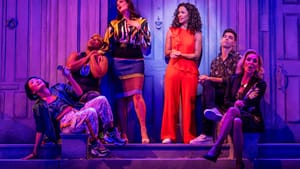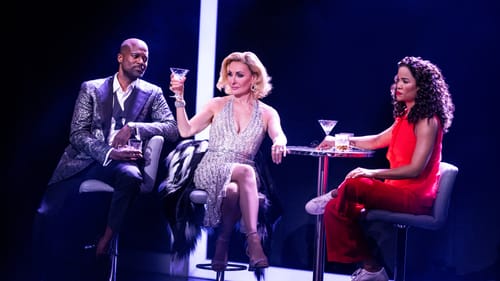Still in good company with Sondheim
The Kimmel Cultural Campus and the Shubert Organization present the national tour of Company

Since the passing of the late great Stephen Sondheim, it has seemed, in some ways, that he is with us now more than ever. A mere month after Assassins closed at the Arden, the second national tour of Company makes its stop at the Forrest Theatre. Broadway currently boasts star-studded revivals of Sweeney Todd and Merrily We Roll Along, while a few blocks down is the world premiere of Here We Are—a theatrical ubiquity that’s traditionally only afforded to Shakespeare.
Sondheim’s presence is not simply felt, however, through sheer volume. In every staging—and, particularly, in the new tour of Company—is the implicit reaffirmation that his is still the template for the modern musical. Directed by Marianne Elliott, this Company follows 35-year-old Bobbie (Britney Coleman, gender-swapped from the original Robert) and her friends, who throw her a birthday party and bemoan her lack of spouse. Through an extended series of vignettes, we witness Bobbie’s encounters with her on-and-off lovers and her married friends in lieu of a traditional plot.
Formal daring
It’s in this formal daring that Company still feels most alive, as fresh as it must have been in 1970. Here, with assistance from George Furth’s book, is where Sondheim sets the tempo of the modern musical, wedding the high-flown tenor of the classical Broadway style to the rhythms of contemporary American life. A musical this good, with such innovation, can succeed even when it’s not so finely tuned, as is the case with this iteration. It’s a delight to behold, even if it doesn’t always hit its marks.
Coleman’s Bobbie proves a smart if shaky center: her charismatic presence shines whenever she shares the stage but loses luster in her solo scenes. She excels, in particular, when navigating her procession of lovers, alternating between the breezy banter of pillow talk and an indissoluble desire for something more. Where the character gets tricky is when she must contend with the root of her indecision, the internal space where the immense burden of societal expectation meets the deep fear of lifelong intimacy. This emotional cocktail is a particularly heady one, and it seems just beyond Coleman’s grasp, culminating in a “Being Alive” that has pathos but never quite comes fully to life.
In mixed company
This shakiness is compounded by the revival’s similarly uneven treatment of gender. With Robert now Bobbie, gender swaps trickle down through the cast: bride-to-be Amy becomes groom-to-be Jamie (Matt Rodin), and Bobbie’s string of lovers—once April, Marta, and Kathy—are now Andy, PJ, and Theo (Jacob Dickey, Tyler Hardwick, and David Socolar, respectively). There are moments where these changes reveal a compelling new dimensionality to the text, summoning a distinct stigma that Bobbie faces as an unmarried woman in her 30s rather than an unmarried man. The marital pressure thus arrives with an uncomfortable new weight; at times, it feels almost palpable on the stage.
For every moment of nuance, though, there is a scene where the revival isn’t quite sure how to adapt to its new dynamics, and we’re left to imagine its more coherent progenitor. Where “Sorry-Grateful” originally showcased husbands singing about married life to a bachelor, giving Robert a peek behind the curtain, it now plays as oddly paternal, as if these weren’t Bobbie’s peers but rather father figures compelling her toward marriage.

Another false note comes at the end of the first act when Jamie (originally Amy) calls off his wedding with Paul (a confident Ali Louis Bourzgi), and Bobbie impulsively suggests that he marry her instead. In the original, this makes sense: Robert imagines what a life with Amy might be like, and his desire for marriage emerges in the heat of the moment. Here, though, Jamie is a gay man, so it is unclear what sort of future Bobbie is envisioning besides perhaps a lavender marriage. The musical also isn’t entirely sure, given the speed with which it moves past the moment, trying not to overthink its own tenuous logic.
A decidedly modern look
Still, there is much to love in this Company—namely, the company. Rodin’s Jamie brings “Getting Married Today” to triumphant life, building his nerved character to a frenzied crescendo that appears closer to endurance sport than musical theater. Judy McLane commands the stage with Joanne’s reliable croons; her “Ladies Who Lunch” is entirely believable as the precipitant of Bobbie’s final catharsis. Other highlights include Sarah and Harry (Kathryn Allison and James Earl Jones II, respectively), two of Bobbie’s married friends, in a comical episode of jujitsu stage play, and Bobbie’s three lovers, alternately sweet and slightly befuddled.
All the while, the world of the play is exquisitely rendered through Bunny Christie’s set and Neil Austin’s lighting design. Most of the sets are contained within small rectangular prisms, each a black box in itself, with white frames that evoke the borders of Polaroids. About these sets hangs a dark void, occasionally shot through with a shock of neon color—suggesting, perhaps, the loneliness attendant to modern life and the longing that loiters within.
It’s a decidedly modern look for a musical that’s more than half a century old, yet it wears it with uncommon confidence. This Company, in the end, resonates with the joy of, say, greeting an old friend at a surprise party. In some ways, it’s been so long, but in others, it seems they haven’t aged a day.
What, When, Where
Company. Music and lyrics by Stephen Sondheim and book by George Furth; directed by Marianne Elliott. $58-$166. Through December 10, 2023, at the Forrest Theatre, 1114 Walnut Street, Philadelphia. (215) 893-1999 or kimmelculturalcampus.org.
Accessibility
Designated wheelchair seating is available in the orchestra section of the Forrest Theatre. The mezzanine is accessible only by stairs.
Sign up for our newsletter
All of the week's new articles, all in one place. Sign up for the free weekly BSR newsletters, and don't miss a conversation.

 Kiran Pandey
Kiran Pandey